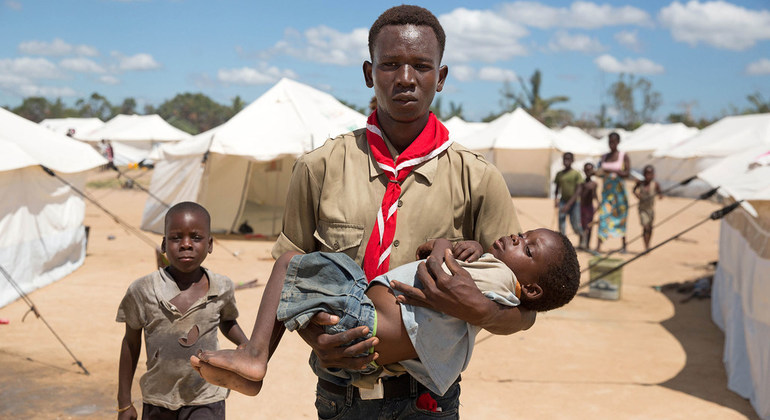‘Zero malaria starts with me’ UN health agency urges grassroots responsibility on World Day
After more than a decade of steady advances in fighting malaria, progress has leveled off, which is why this World Malaria Day, the World Health Organization (WHO) is supporting a grassroots campaign to emphasize country ownership and community empowerment to improve malaria prevention and care.
“Every two minutes a child dies from this preventable and treatable disease”, said WHO Director-General Tedros Adhanom Ghebreyesus.
Read our in-depth coverage.
Aid preparations gear up as Mozambique braces for second massive storm
Emergency measures are being stepped up by the UN and partners in northern Mozambique, amid fears that another devastating tropical storm could batter coastal areas on Thursday evening, weeks after Cyclone Idai claimed hundreds of lives and flooded vast swathes of the south of the country.
“We are expecting that heavy rain will provoke flash floods and landslides impacting the north-eastern provinces of Cabo Delgado and Nampula,” Word Food Programme (WFP) spokesperson Herve Verhoosel said.
Find our full story here.
Change attitudes for future generations of women in tech, UN urges
When women and girls are empowered with technology, the whole world benefits. That’s one key message from the International Day for girls in the field of information and communications technology, or ICT, marked on Thursday.
Celebrated every year on the fourth Thursday of April, the Day is an initiative of the International Telecommunications Union (ITU) and aims to encourage and empower girls and young women to consider entering the growing field of ICT, enabling both girls and technology companies to reap the benefits of greater female participation in the sector.
Find more details here.
UN project to aid 140,000 in the Sahel
The Food and Agriculture Organization (FAO) and European Union announced on Thursday a new project to strengthen the resilience of agropastoral communities which cross national boundaries in the Sahel.
Targeting several priority zones, including Senegal, Burkina Faso, Mali and Niger, the aim is to improve food security, country-level investments in building resilient livelihoods, and policies to support communities.
“Major investments in rural development and agriculture must be integral to peacebuilding efforts”, FAO Director-General José Graziano da Silva said while visiting Senegal.
The Sahel remains affected by conflict, malnutrition and population displacement rendering millions in need of urgent assistance each year. The project, which will benefit 140,000 people – many of whom are vulnerable pastoralists – will help to address these crises at their roots, according to FAO.
‘A dark day’ for media freedoms in Myanmar
UN human rights experts said on Thursday that the refusal of Myanmar’s top court to consider a final appeal by two jailed Reuters journalists “represented a dark day for media freedoms and democracy in the country”.
Incarcerated for seven years in connection with their 2017 investigation into the massacre of Rohingya men and boys at Inn Din village in Rakhine State, the Supreme Court on Tuesday rejected the appeal by Wa Lone and Kyaw Soe Oo.
The experts underscored that neither committed a crime, saying: “They were doing their job as investigative journalists, reporting on issues of the upmost concern to the people of Myanmar” and performing an essential “democratic function”. The Special Rapporteur on the Situation of Human Rights in Myanmar, Yanghee Lee and Special Rapporteur on Freedom of Expression, David Kaye, called the upholding of their convictions “a grave injustice”.
Last week, both journalists were awarded the journalists a Pulitzer Prize for their reporting.
UN human rights experts call on Israel to overturn deportation of Human Rights Watch director
UN independent human rights experts expressed grave concern on Thursday at the revocation of the work permit for Mr. Omar Shakir, the Israel and Palestine Director of Human Rights Watch. They urge Israel to reverse a deportation order and to allow him to carry on with his human rights work.
On 16 April, an Israeli court upheld a deportation order against Mr. Shakir. Human Rights Watch will appeal the ruling of the District Court to the Israeli Supreme Court.
“This ruling threatens advocacy, research, and free expression for all and reflects a troubling resistance to open debate,” the three human rights experts said, calling it “a setback for the rights of human rights defenders in Israel and the Occupied Palestinian Territory”.
“The grounds for revoking Mr. Shakir’s work permit appear to be tied directly to his human rights advocacy, and have nothing to do with any assertion of illegal conduct.”
Israel had revoked Mr. Shakir’s work permit on the grounds that he had supported the boycott, divestment and sanctions (BDS) movement in the past. The UN experts noted that Human Rights Watch has stated that neither the organisation nor Mr. Shakir promote the boycott of Israel and that they work “to discourage economic support for Israel’s illegal settlement enterprise”.
The UN experts pointed out that expressing support for, or opposition to, BDS, is fully guaranteed by the rights to freedom of opinion, expression and association; they urged Israel to reverse the order.
UN official ‘alarmed’ at recent escalation of violence in Syria
In the past week, at least 36 civilians have been killed and dozens more injured in an escalation of violence and hostilities in north-western Syria, including a new wave of shelling and airstrikes across Idlib, said Panos Moumtzis, the UN Regional Humanitarian Coordinator for the Syria Crisis.
Strikes on schools, markets and displacement camps are creating panic and havoc among the civilian population. Moreover, 17 civilians were killed during an “unidentified” explosion in a market on Wednesday.
“Rescue workers worked into the night to remove people from the rubble of the buildings, with one woman successfully being rescued after 10 hours”, Mr. Moumtzis explained.
Such attacks and violence are “abhorrent” and cause “unconscionable suffering” for civilians,” he said, adding that the most recent violence has forced large numbers of people from their homes, “compounding an already precarious humanitarian situation on the ground”.








